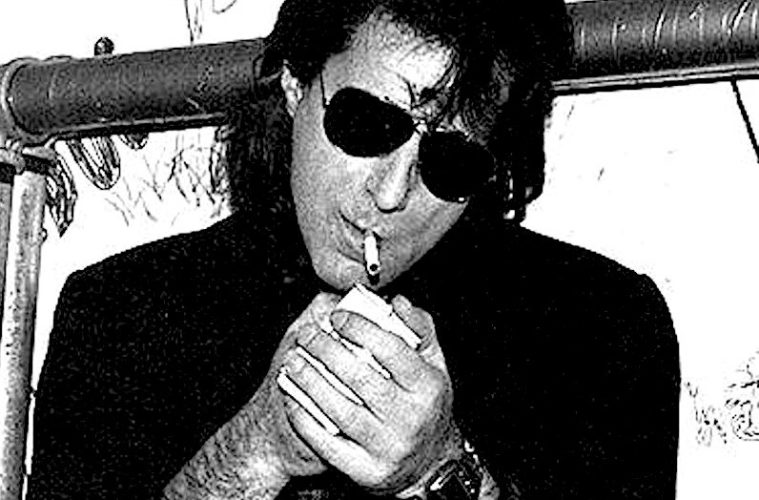The Teaszer (which was subsequently replaced by a couple of swanky dance clubs over the years) was a place of excitement and possibility back in ’80s and ’90s, and it changed the scene in many ways that even the better known and still-standing Viper Room, Roxy and Whisky didn’t. The open-minded booking policy that Fagan encouraged gave so many acts their first shot, including the likes of Guns N’ Roses, Green Day, Rage Against the Machine and Weezer, the latter of whom had a residency when I worked there as a door-girl in the early ’90s. I loved Weezer’s music even back then, but the singer wore glasses and a baseball cap on stage and next to the black-haired pretty boys of the time, I thought the band too nerdy to actually ever make it. Shows ya what I knew.
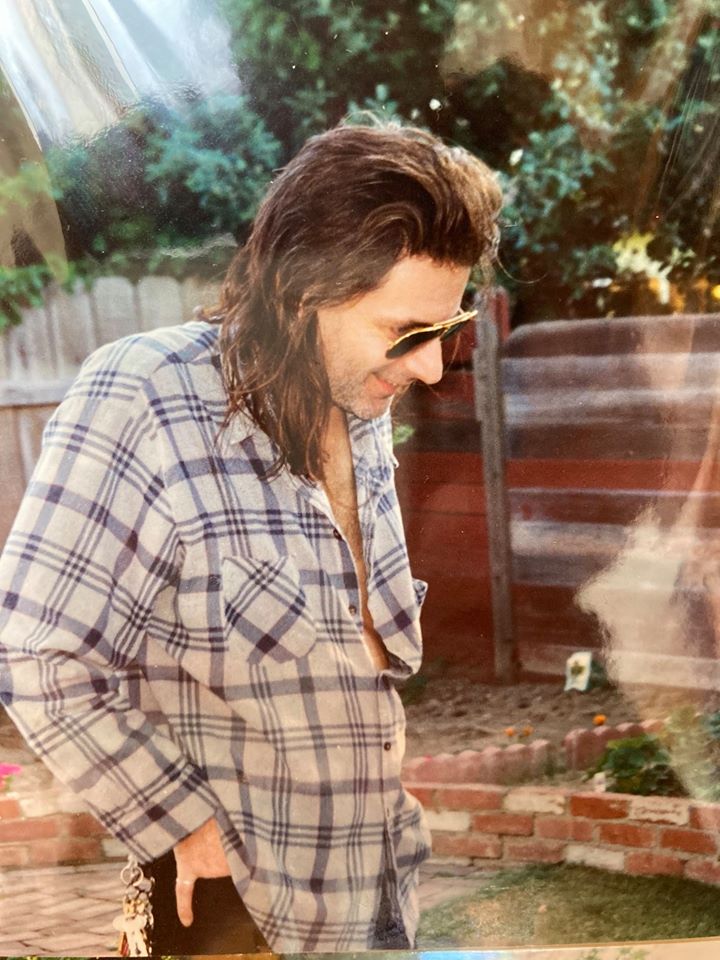
(Courtesy Audrey Jackson)
Barely old enough to step foot inside a club myself, my passion for music was part of who I was and wanted to be. I think the guy who helped make so many band’s dreams come true hired me for the same reasons he gave them their moment onstage. I wanted to be a rock journalist one day and I hoped that working at a club like the Teaszer would be an education. It was. The job paid crap and door people (yes, we were all female) were also required to work in the office once a week, helping with phones and the club’s bookers, who, other than Len, also happened to be female.
“Len was a respectful champion of women, long before Lilith Fair or it became a popular position,” notes Audrey Jackson, the Teaszer’s head booker for 14 years and someone I learned a lot from while spending time there. “Before I met my husband Steve, Len came to my defense on numerous occasions going as far as throwing dudes out of the club if he felt they were out-of-line towards me. It was thankfully rare, but knowing he would go to blows for you, and he almost did, showed his loyalty was above and beyond. I no doubt attribute this respect toward women from his relationship with his mother.”
“When I met him, he lived in Laurel Canyon and to me, that added to his aura,” shares Doreen Sanchez, the other successful booker I worked with during my time at the club. “He gave everyone a chance and if he knew that you knew things about rock & roll that he didn’t expect, he was in heaven. His respect is and was such a badge of honor. He was rock & roll. The Sunset Strip will never be the same. The real king has left the boulevard.”
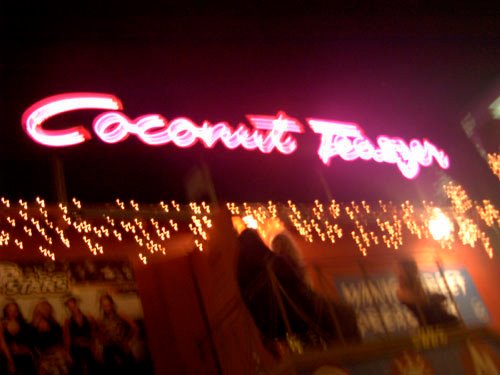
(WikiMedia Commons/Beverly Pills)
If you’re an L.A. native of a certain age, you remember The Teaszer even if you never stepped foot inside. It stood at what many consider the “start of the Sunset Strip.” After Crescent Heights, the billboards got bigger and back then, the foot traffic got busier. When the club was painted purple as part of a promo for the glam band The Zeros, it became an audacious landmark — some might say eyesore — and it stayed that way for a long time, even when music changed and it became known more for after-hours events like the crack of dawn dance party Does Your Mama Know?
When I ran the guestlist at the Teaszer, they were always long but there was always a discount list too. You got a lot of bang for your buck there. They never did “pay to play” but they did expect bands to promote and those who wanted it bad enough did so with gusto, filling the club with friends at first and if they were good enough, fans eventually. They’d have huge bills starting early in the evening and going til late at night; and the opening acts really worked to be part of it and get the exposure. That’s how headliners were made. Simple enough, but it was a different time. I tried my hand at booking shows in Silver Lake many years later, and I never saw bands work so hard on flyers and promo as I did when I was at the Teaszer. And while one might say the internet’s made acts lazier, I think it had to do with what the Sunset Strip was like at that time, the energy, and the magic that Len cultivated at the club he ran. I saw this development and dynamic right before my eyes so many times. I eventually worked all the ASCAP nights at the club which was one of its most popular not only because of the variety of music showcased, but because of the free chicken wings and mini hot dogs that were part of its bustling patio scene. Starving rockers flocked there every week.
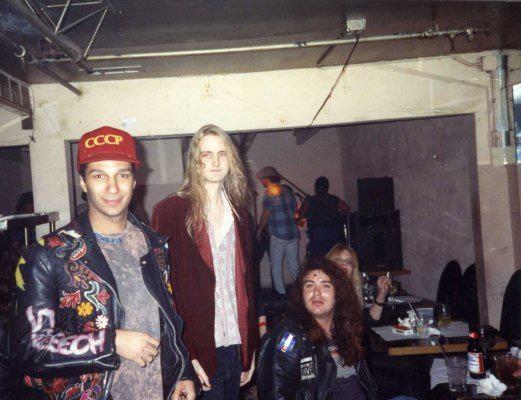
Tom Morello (left), Peter Fletcher (right) and Scott Tracy (middle) at the Teaszer (WikiMedia Commons/Beverly Pills)
Fagan was a rock drummer himself (he played with Arthur Lee’s Love for a brief stint and a few other projects) but his love of music led him down a different path- offstage, but not exactly behind the scenes. He was a character in many ways, sort of like a crazy uncle, but he was utterly cool, and if he thought you were cool — well, you were.
Recalls writer, producer and musician Bruce Duff, “Len was always kind to me and encouraging. Back in the ’80s he did a drive-around with me through Hollywood and showed me all the sites of the clubs he played in the ’60s and had a variety of memories to share, both personal and informative. It was my Local Club column for two weeks running in Music Connection. He had my band Jesters of Destiny on many great bills. He would always say, “Bruce, you should be singing more.” He was full of admiration for anyone who could stick it out in the club scene and was always willing to help out new bands and returning veterans.”
“My life would not be the same without him,” says musician and author Iris Berry. “In the 1980s when I was in the Lame Flames he gave us a residency at the Coconut Teaszer and he spoiled us. One night he sent a Limo to Disgraceland to pick us up. Oh, if we only had cameras back then. I can remember flyering Melrose with Mandy and Lisa, and every store we’d walk into they’d say, ‘Len Fagan was just here singing your praises.’ He was basically two stores ahead of us. Every band I was in, every creative move I ever made, Len was there to support me and cheer me on with great affection. Len treated all of us like family. He wasn’t just booking our bands he was always there to help us in any way he could. We all owe Len Fagan a huge debt of gratitude.”
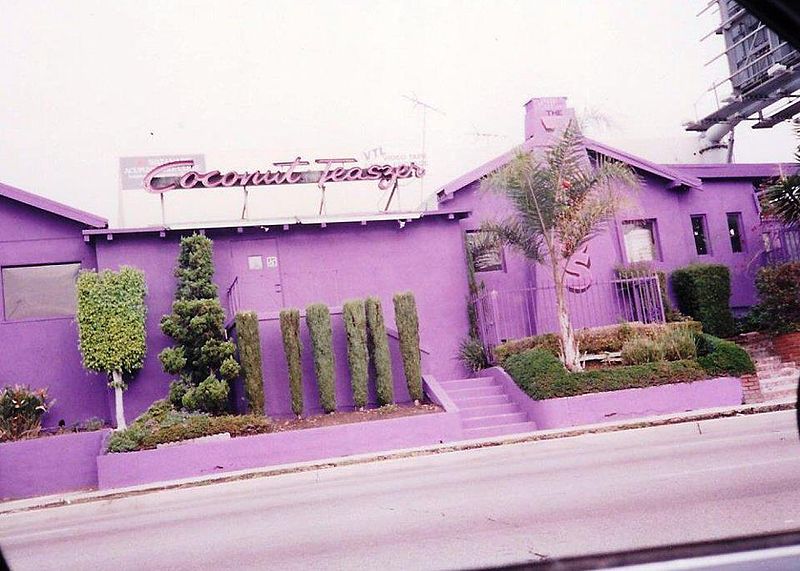
The Coconut Teaszer (WikiMedia Commons/Beverly Pills)
Fagen’s Facebook page is currently filled with countless reminiscences and words of admiration as stated above. And beyond the appreciation for support of their music projects, almost everyone says that their bond lasted beyond the scene’s heyday. He just cared about people and continued to do so long after he was a power player.
“He was so good to me and my brother Barry during our early years in Los Angeles, ” says musician and music journalist/editor Bill Holdship, who also wrote about Fagan on his own Facebook page. “In fact, he was so good to many local bands and musicians. I worked closely with him and ASCAP when I was at BAM [magazine] on our regular “L.A.’s Best Kept Secrets” showcases; we even presented the Cowsills and the Continental Drifters there one night. I saw an unannounced solo Kurt Cobain performance there on a different night; Green Day before they were signed or famous (they “opened” for my brother’s band, in fact, thanks to Angry Samoan “Metal” Mike Saunders who set up the showcase), Dwight Twilley doing one of his first showcases in years…and on and on and on. Some people considered the place a bit of a “dump” but it was a home away from home to many of us.”
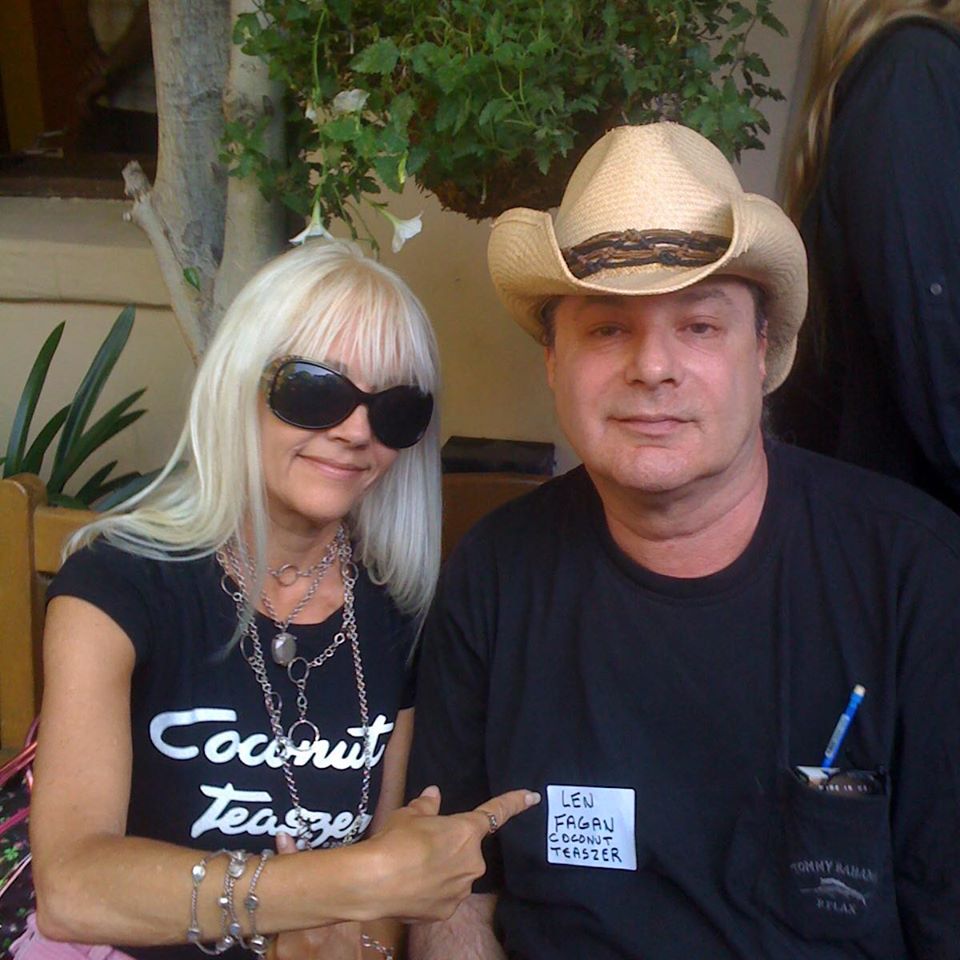
Fagan with L.A. events promoter and marketing queen Heidi Richman. (Courtesy Heidi Richman)
As Jackson shared on her social media, in the early 2000s Fagan became ill and was transferred into a lockdown rehab. He emerged clean and sober with a new lease on life. He moved in with his mother in the Valley and took care of her until her death. But in 2017 he suffered from a stroke and had been in and out of hospitals ever since. His weakened immune system made him vulnerable to coronavirus, as it has so many over 70.
I re-connected with the L.A. legend on Facebook several years ago and I was surprised he even remembered me as the Teaszer surely had dozens of doorgals over the years. But I had in fact, started interning at the Weekly just before I left the club and I guess he followed my career — just like it appears he did with all the music makers he helped pursue their passions. Some “made it” and some didn’t but that was almost beside the point. It was always about the music that bonded us all, not the fame or glory.
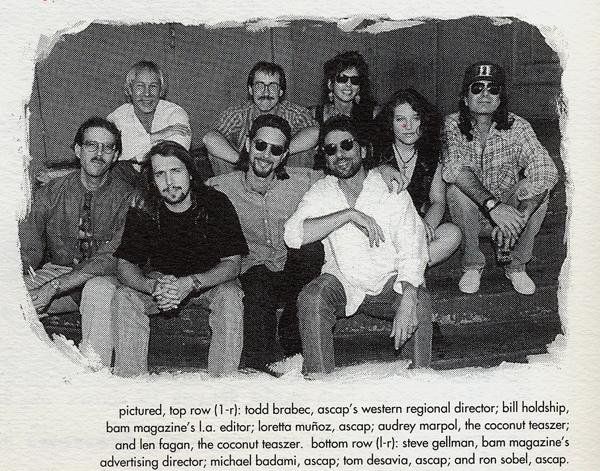
(Courtesy Audrey Jackson)
“Len knew the secrets of inclusion, how widening your circle benefits all, and how true community matters,” adds Jackson, who hopes to do a tribute event for her mentor or as Fagan always wanted, a “roast” when we get past the pandemic crisis. “We did countless benefits at the club, some large events, and some intimately small. Len was always there when someone needed a helping hand.”
12/29/11,8:18 PM
Hi Lina. Back in the mid 80’s, I used to write for a local, weekly paper called Entertainment Today. Among other things there, I had my own column about live music in L.A., where I went to several shows each week and wrote a paragraph or two about each show, within the column. I called the column, “Midnight Ramblings.” It just came to mind that you might find it a descriptive name for one of YOUR columns. The name hasn’t been used since early 1987. Seems it might suit you, in particular, if you think it could work for you. (Keep in mind, I always wrote that column between the hours of 3 to 6 p.m. — usually in a drug-induced stupor. Wouldn’t want to see you do the same!!) If you like it, feel free to use it. If not, please don’t suggest the title to another writer, however. Only want to pass this on to a deserving, quality journalist with an irreverent spirit!! Happy 2012 to you!!
Advertising disclosure: We may receive compensation for some of the links in our stories. Thank you for supporting LA Weekly and our advertisers.

